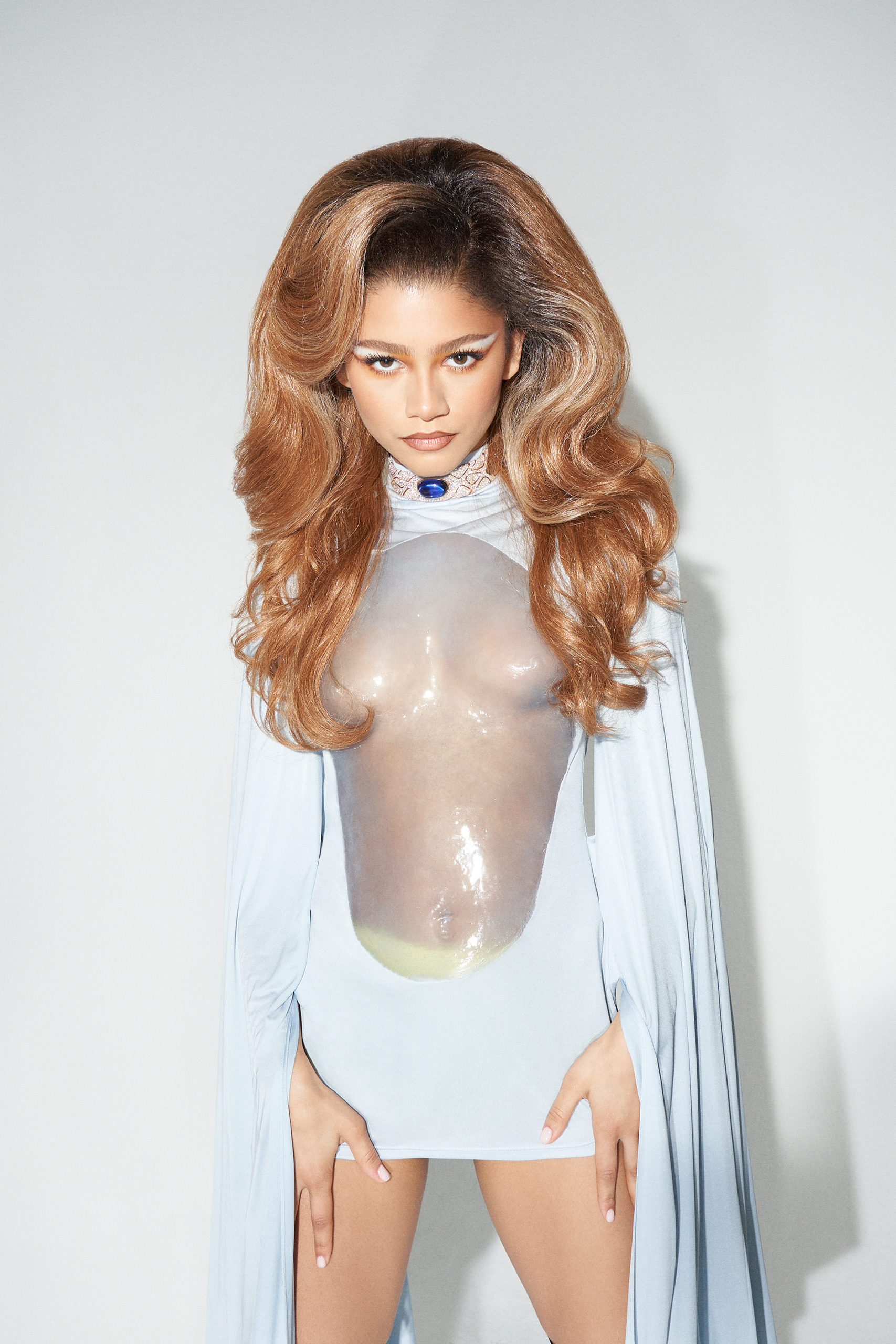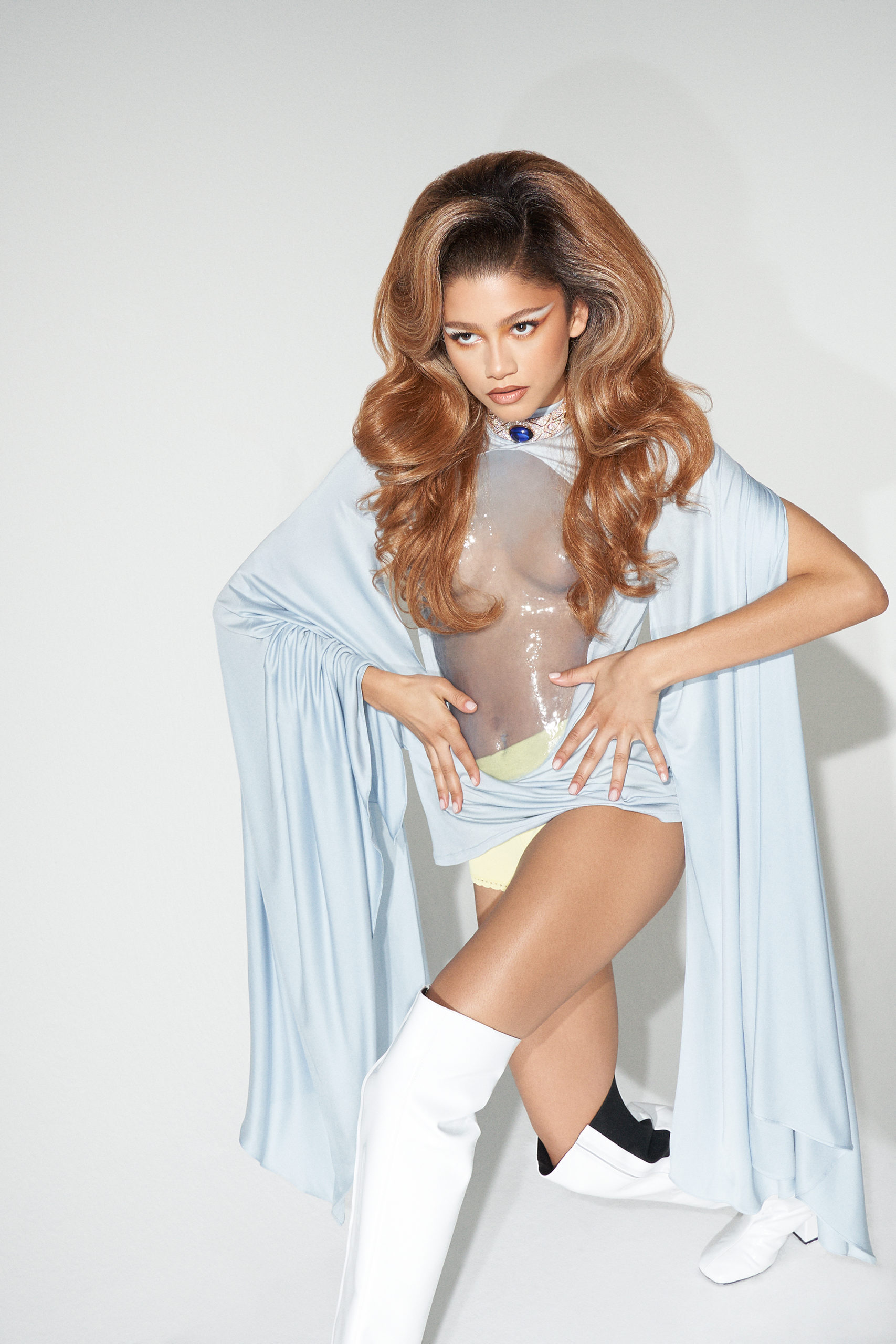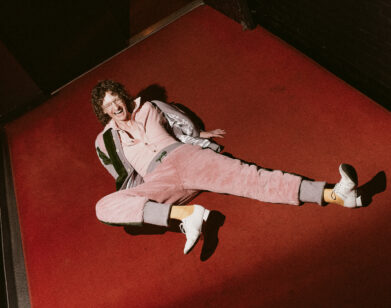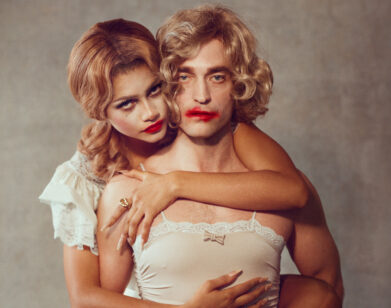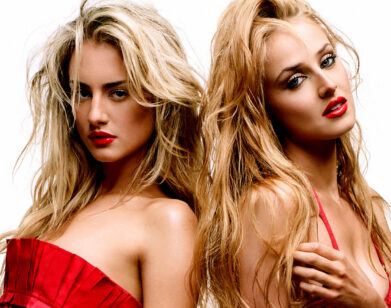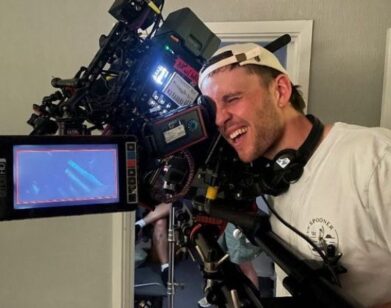cover story
Zendaya Tells Colman Domingo How She Found New Purpose
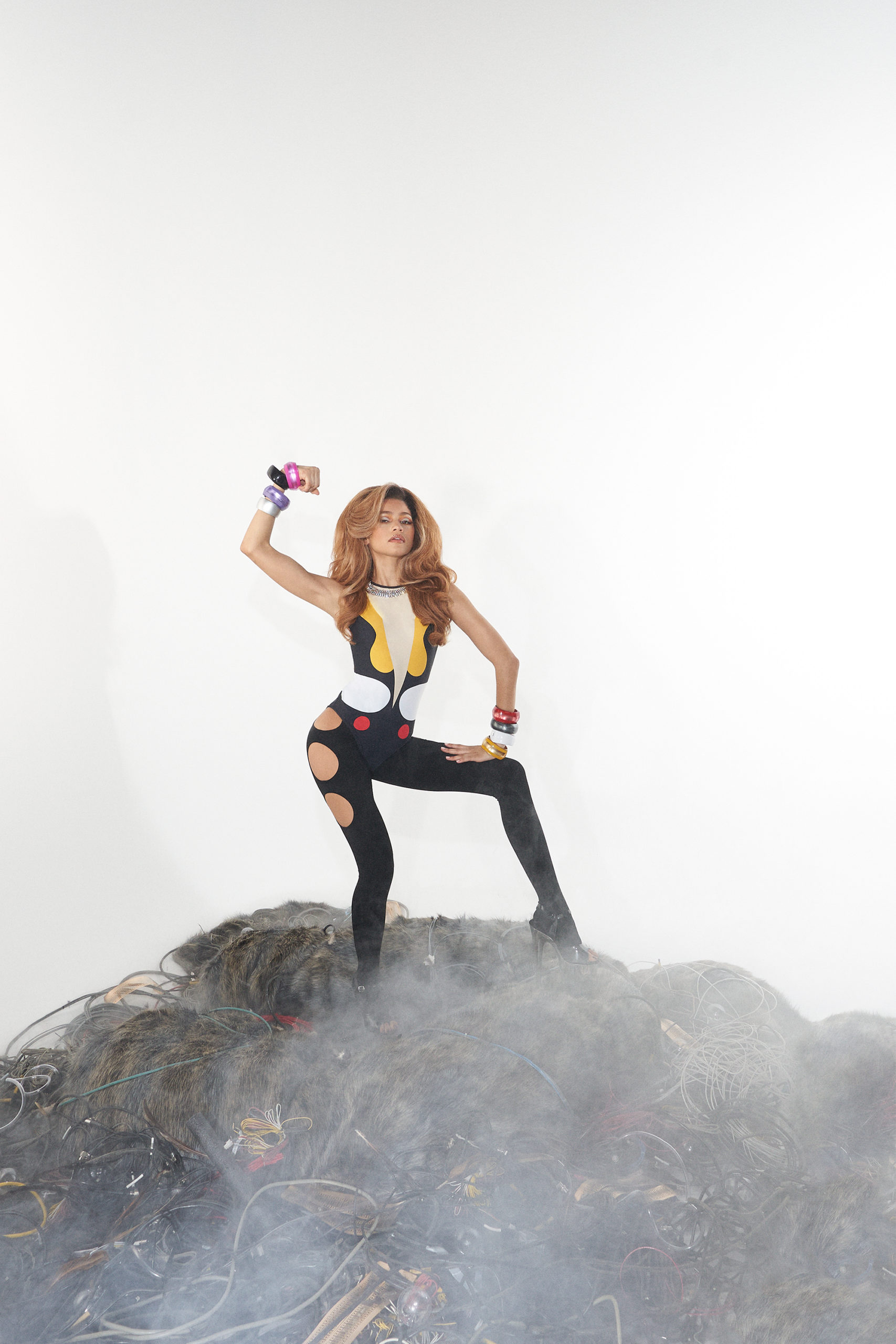
Bodysuit and Leggings (worn throughout) by Burberry, Necklace by Serpenti High Jewelry by Bvlgari, Bracelets (worn throughout) by Jet Rag, Shoes by Pleasers.
When Zendaya Maree Stoermer Coleman decided to go mononymous, it wasn’t just a flex, it was an omen. Only a chosen few have reached the kind of superstardom that can support just one name, and at the age of 25, the Oakland-born former Disney star has done just that. A bonafide movie star in a culture that no longer seems to want them, and a fashion icon in a world where everyone is a model, Zendaya closed out the year by starring opposite Timothée Chalamet in the sci-fi opus Dune, before reprising her role as M.J. opposite Tom Holland in Spider-Man: No Way Home. But that was just a warm-up for the second season of the HBO drama Euphoria, which marks her return to the role that made her the youngest woman to ever win an Emmy for best actress in a drama series. As Rue Bennett, the sometimes messy, always mesmerizing, struggling addict she plays on the show, Zendaya reached new heights in front of the camera, delivering a haunting performance that is both hard to watch and impossible to look away from. It’s a role, as she tells her Euphoria costar Colman Domingo, that’s given her newfound purpose. —BEN BARNA
———
COLMAN DOMINGO: Hey, Z. How’re you doing?
ZENDAYA: I’m good! Thank you so much for doing this.
DOMINGO: Are you kidding me? This is fun! I get so over-prepared for things like this because I’m such a nerd. I was preparing like it’s a Senate confirmation hearing. I was like, “Just take a breath. You’ve got some questions.” Basically, I want people to know the young woman that I’ve been getting to know.
ZENDAYA: Well, we love to talk.
DOMINGO: I wanted to ask you a question that I’m fascinated with because, you don’t know this, but when I was in school, I studied photography and I loved Gordon Parks and Richard Avedon and all of these phenomenal photographers. And I noticed that you’ve really taken to photography. What is that for you?
ZENDAYA: I’ve always wanted to get into photography. My grandfather was a photographer—he was also a lawyer, but in the time that he wasn’t being a lawyer, he was a photographer. And my great-grandfather was a photographer as well, in Hollywood, actually. So, I always admired their photos. My grandfather passed when I was 11, but have a lot of his photography in my home. And my mom would tell me stories about how he’d go out and use his light meter, sometimes spend all day taking photos of the same thing as the light changed. As I got older, and with as many photo shoots as I’ve been on, I really started to understand and learn more about light—how it’s reflected and what lights are being used. I’ve now gotten to the point where I love working with certain photographers that understand light and allow me to play with the lights, because I’m like, “Okay, listen. Your girl likes to have her light from here.”
DOMINGO: That’s awesome.
ZENDAYA: Another thing that’s engaged my interest in photography is [Euphoria cinematographer] Marcell [Rév]’s work. Anyone who’s seen his work can attest to the fact that he’s a master of his craft. We’re using Ektachrome this season—that’s almost impossible to shoot, and he somehow does it flawlessly. So, when I’m on set, I’ll ask him what all the names of the different lights are and what they do and why they need them, and I try to guess what he’s going to say before he says it. I’m always so nervous to try things because I don’t want to not be great at them. But I was like, “You know what, let me buy a bunch of film cameras and just start trying, and then if I need help, I’ll ask people like Marcell.”
DOMINGO: But that’s exactly the way it’s supposed to work. It’s always been a craft. Any great art form—it’s about figuring things out. It’s not actually formalized. It’s, “Hey, I have an idea. I have questions about this,” and you figure that shit out.
ZENDAYA: With scenes, we do that all the time. If it’s not working, if it doesn’t feel right, we sit down and we talk about it. It’s about that fear. I think something that many actors have, which is something you learn, is that you can’t be afraid to look stupid, you can’t be afraid to mess up, you can’t be afraid of anything. I’m trying to apply that to other parts of my life, because I’m always afraid to do things in fear of not being great. But the only way to get great is to be fearless and try.
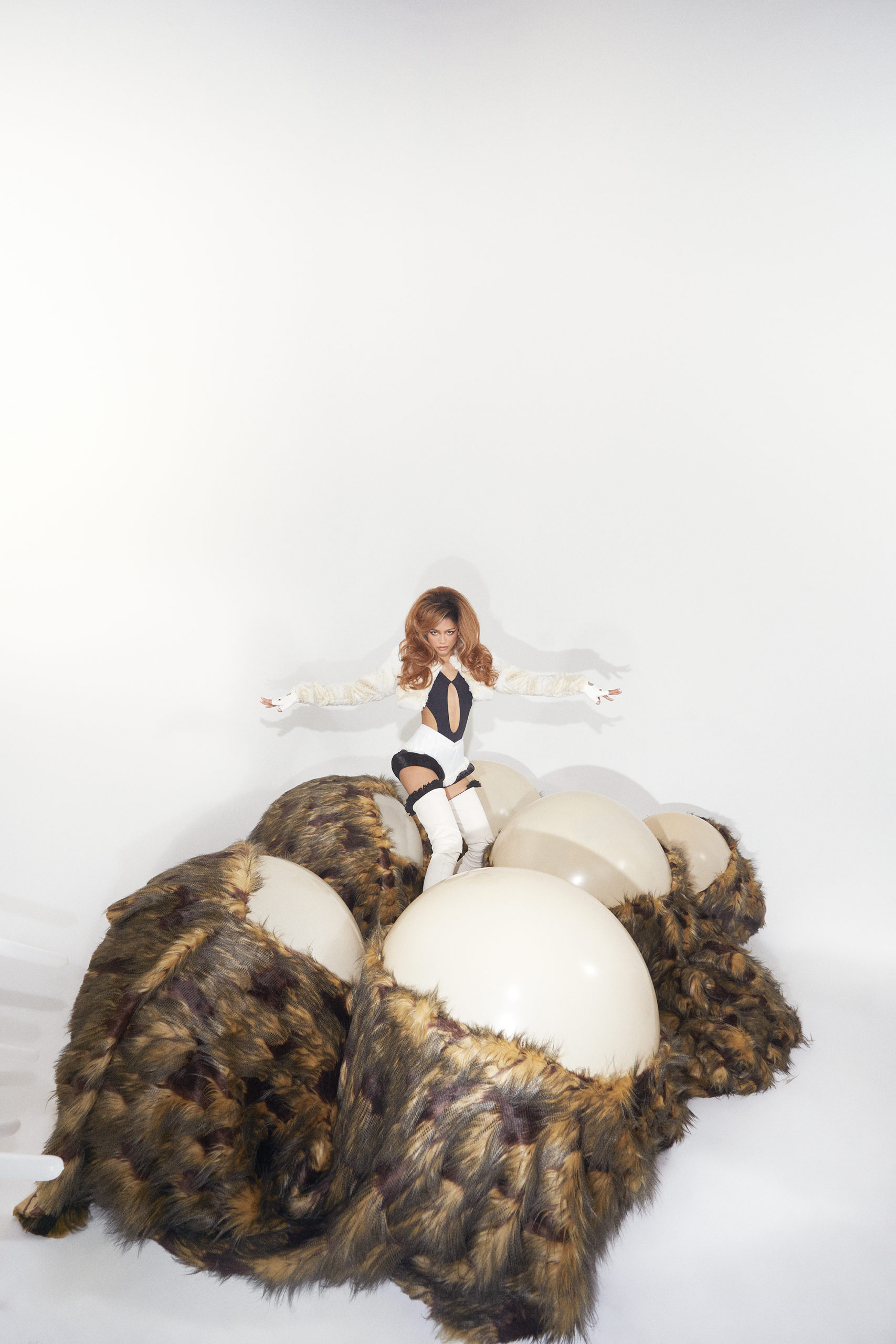
Jacket, Shorts, and Boots by Givenchy, Bodysuit by Maximillian, Gloves by Gaspar.
DOMINGO: Is this new for you, putting yourself out there, trying something, having that courage?
ZENDAYA: Absolutely. Euphoria in and of itself was a big step. But there’s always a gut feeling—when something feels like it’s for you. You just feel immediately connected to the character, the material, like it’s something you have to do, something you can’t let go of.
DOMINGO: Exactly. I always extend it to not only the project, but the people around it, because we spend so many hours creating something. I look at it like, “I’m going to be spending 12 hours a day on this, I’m going to be researching 6 hours a day before I even get on a set. I want to make sure I’m going to love these people,” because I think that’s what really matters. You’ve been doing some incredible work, and you’ve been following your instincts and have built such a tremendous career, and in a short amount of years. You’ve been working since you were a kid, but you’re still a young woman. What are you looking forward to in your career? Is it expanding as a director? I know you’re producing now. Are you interested in that even more as well? What’s on the horizon?
ZENDAYA: All of that. I don’t necessarily have a plan. I’ve never really thought, “I have to do this by this time and I want to do this by that time.” I just want to do the things that make me happy and bring me joy and fulfill me as an artist, as a person. So, I keep that loose, because if one day it turns into a completely different career path, then I would allow myself to do that. The idea of trying to direct in the future excites me. That’s why I’m on set so much. When I’m not in it, I’m right there trying to learn. I go around and I ask our crew members, “What are you doing today? Can you explain it to me?” Because we’ve got some real vets in the game. So, the hope is that I’ll be able to, one day, make the things that I want to see.
DOMINGO: Like what? Give me an example.
ZENDAYA: Like a simple love story about two Black girls.
DOMINGO: Yes.
ZENDAYA: And I don’t want it to be rooted in anything other than just a story about two people falling in love and that’s it. Something simple and beautiful, that leaves you happy and wanting to fall in love yourself.
DOMINGO: Are you a bit of a romantic?
ZENDAYA: Of course. But I also feel I just haven’t seen that without it dealing more with the traumatic side of things—which is really important to talk about, but I would love a coming-of-age story where awkward and funny things happen, just like when any other young person is trying to figure out who they are.
DOMINGO: Right. We can’t just be. We can’t just exist.
ZENDAYA: Our existence is broad and expansive and beautiful, and to see all the different emotional colors of what it means to be a young Black girl—I would like to see that, because I don’t think I’ve seen many depictions of it.
DOMINGO: Absolutely. I have a question for you. Have you met Michelle Obama?
ZENDAYA: I have.
DOMINGO: How was that?
ZENDAYA: I always say it’s like meeting your auntie, like you know her already.
DOMINGO: Because she’s so warm. I met her when I went to the White House years ago for the movie Selma. When she and Barack walked in, they were like superheroes, and I just couldn’t stop smiling. I don’t know what I said. I just smiled the whole time. Did you put together a sentence?
ZENDAYA: The first time I met her I was quite young, maybe 14 or 15, at the White House Easter Egg Roll.
DOMINGO: Wait, what were you doing there?
ZENDAYA: I performed there. I have a picture, but I don’t know what I was wearing—I don’t even want to talk about it.
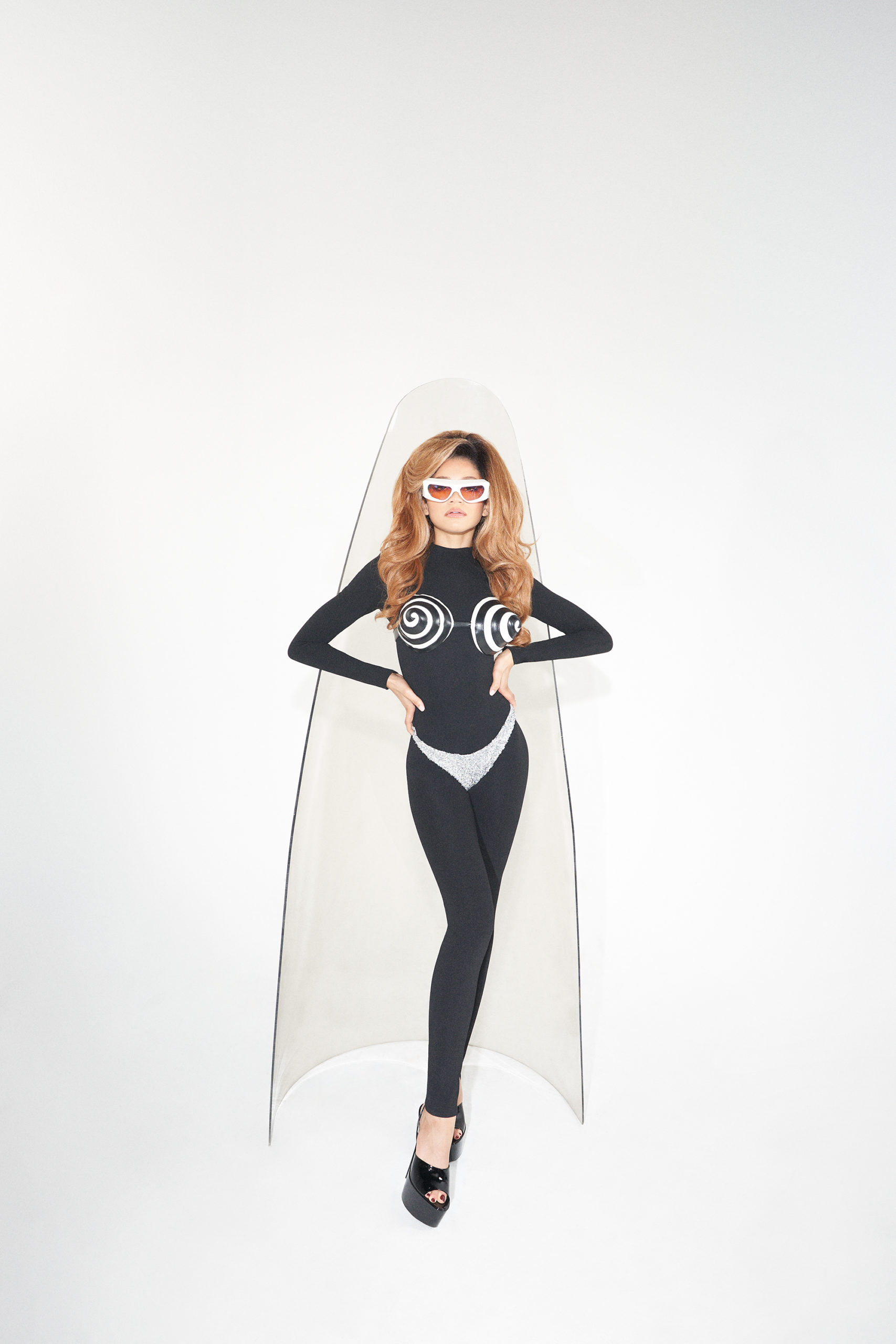
Bra and Catsuit by Schiaparelli, Briefs and Sunglasses by Coperni, Shoes by Saint Laurent by Anthony Vaccarello.
DOMINGO: What do you mean? Did you look like the Easter bunny?
ZENDAYA: It was my performance outfit. I had leg warmers on or something. It was not it.
DOMINGO: It wasn’t cute? [Laughs] I asked because I know Michelle Obama is one of your heroes.
ZENDAYA: Right. I have a lot of heroes—a lot of sheroes. One of my biggest sheroes is my grandmother. I love spending the day with her because she is a character, and she can talk. That woman loves to talk.
DOMINGO: Does she gossip?
ZENDAYA: Oh yeah, she’ll gossip. She’ll talk about the old days, she’ll talk about the new days, she’ll talk about everything. But I like just sitting with her and talking about her life. The thing is, as you get older, you value that time more. When I was younger I didn’t ask my grandma questions about her life. She was just my grandma. I spent a lot of time with her, but I didn’t ask her about how she grew up or about her family and her friends, what life was like for her. She’s 93 years old, so she’s got a wealth of knowledge.
DOMINGO: Once I came of an age where I recognized my mother as a woman and not just my mother, I was able to have different conversations with her. Do you have conversations like that with your grandmother?
ZENDAYA: Yeah, absolutely. I asked her about my dad. I asked her about her siblings and what it was like growing up with them. She’s from Little Rock, Arkansas, and she met my grandfather when she was very young. They got married when she was 14 or 15 years old. It was a very different time. Eventually they were no longer together. They were separated. But she’s a little shady about it.
DOMINGO: She’ll throw some shade? Is your grandfather still living?
ZENDAYA: No, my grandfather’s no longer around. He passed when I was quite young as well. But she’s funny. She’s quick, sharp as a tack. And she’ll talk to anybody, if she likes you. And she really likes me.
DOMINGO: Is she still very active?
ZENDAYA: Unfortunately her body, that’s another thing. Her body has given out a bit over the past few years, so she can’t do what she used to. She says, “Your girl’s still kicking, just not too high.”
DOMINGO: I love that you are so connected to your grandmother, because I’ll tell you, I just came back from D.C. this past week, and I made a point to go to the National Museum of African American History and Culture. Have you ever been there?
ZENDAYA: I went as soon as it opened.
DOMINGO: It’s still resonating with me, in particular this quote from Maya Angelou, which is, “Bringing the gifts that my ancestors gave, I am the dream and the hope of the slave.” To see the experience of our people and how we’ve traversed and made culture, created, and survived—I think you’re a very deep person, and I’m sure you have thought about this, but do you recognize that you are the dream and the hope of the slave?
ZENDAYA: I have so much to be grateful for. Even talking to my grandmother, her world and her existence was so different from mine. I can be the manifestation of all of her prayers for me, and that’s really cool. I hope to continue to make our ancestors proud. Our existence, you being who you are, you doing what you do, is continuing to open doors and to be their wildest dream. We just have to exist in our most beautiful form to continue to do that.
- Top and Briefs by Loewe, Necklace by Magnifica High Jewelry by Bvlgari.
- Top and Briefs by Loewe, Necklace by Magnifica High Jewelry by Bvlgari. Boots by Courreges.
DOMINGO: Absolutely. That goes back to what you were saying you hope to create, because that’s also my hope: to create those moments where we just exist, where we just are.
ZENDAYA: I always think, in what ways is my voice most potent or palpable? I’m not really active on social media like I used to be, but that’s for a reason. I love saying how I feel and speaking out about things, but I also don’t want to say that I just tweeted my life away. That I just tweeted about something, but what did I actually do about it? Hopefully my ability to be a storyteller, to make those stories that I haven’t seen, to showcase different forms of Black love and the different colors of our emotional experience—that will be my speaking out. That’s my action. Because we learn how to be a person not just through interactions, but by watching movies and TV. You want to be like your favorite character. So many people have built the personas that they take out into the world based on what they’ve seen in the media.
DOMINGO: Right. What do you say about the many young people who you can tell from a mile away, like, “Oh, they watched Euphoria.” Their makeup, their hoodies, things like that. My hope is always that they’re also interrogating a little further and not emulating.
ZENDAYA: Of course. It’s not a show to emulate. The show’s intention, for all of us who make it, is to open up the door to empathy for another person’s experience. Rue has helped me do that, tremendously. Before meeting Sam [Levinson, Euphoria creator], before playing Rue, I didn’t understand in grave detail the experience of what it means to be an addict. Nor did I feel I had enough—maybe some, but not enough—empathy for that experience and how it is, like your character Ali says, a degenerative disease. My hope is that the show makes somebody who has either gone through addiction, or knows somebody who has, feel they are less alone in their experiences, and that maybe it gives somebody the lexicon to communicate with their loved one who needs help, or it gives the ability for that loved one to say, “Listen, this is how I feel. I couldn’t explain it to you, but just watch this and you’ll understand where I’m coming from.” Because the cool thing about Rue is, she makes bad decisions and she hurts a lot of people, but we still love her and we still root for her, and that’s a feeling that I hope people will take on with their own loved ones or other people suffering from addiction.
DOMINGO: Right.
ZENDAYA: When we did the diner episode, a lot of people were a bit thrown off. Like, “Wait a minute, y’all are just gonna stay in the diner and talk?” Some people didn’t quite understand it. Then I saw a tweet that was like, “If you’re just here for the glitter makeup, then you’re missing the point.” All of that is part of the fantasy of filmmaking, but then we really had a moment with building an episode out of the pandemic that just focuses on people and what was really happening with Rue throughout the season and leading up into this next season that we’re shooting now. People got to see what our show is really about. All those parts of Euphoria, they are Euphoria, but they aren’t the core of what it is. The core of Euphoria is these very raw and honest emotions, and these conversations that I hope help us gain empathy.
DOMINGO: You’re so right. I think these are conversations that we want people to have. That special episode we did is probably one of the things I’m most proud of in my career.
ZENDAYA: I would agree.
DOMINGO: Just like you said, it really did open up hearts to empathy. I don’t look at Twitter that much because I think it’s like going into the garbage can, and you’ve got to be careful what you’re going to pick out of it. But sometimes you find a gem. And this one dude, he sent me a DM saying, “Thank you so much for that episode. I didn’t feel so alone anymore. And I feel like I can go on another day.” It still makes me want to cry when I think about it. There was also a woman who said, “You helped me to understand my son, and not to judge him but to understand it’s a disease.” So, that’s the whole framework of Euphoria. If we can do that, man, we’re changing the world. Our art can really impact lives—that’s the purpose.
ZENDAYA: My parents were teachers. We need those people. So, sometimes as an actor, I’m like, “I’m just make-believing for a living. What am I doing?” And those are the moments where you’re like, “Okay, there’s a reason why I’m doing this.” I’m so grateful to have shared that episode with you. I learned so much from watching you. I was just sitting there taking a front-row–seat masterclass. So, if you ever see anything in my future performance that looks familiar, you know where it comes from.
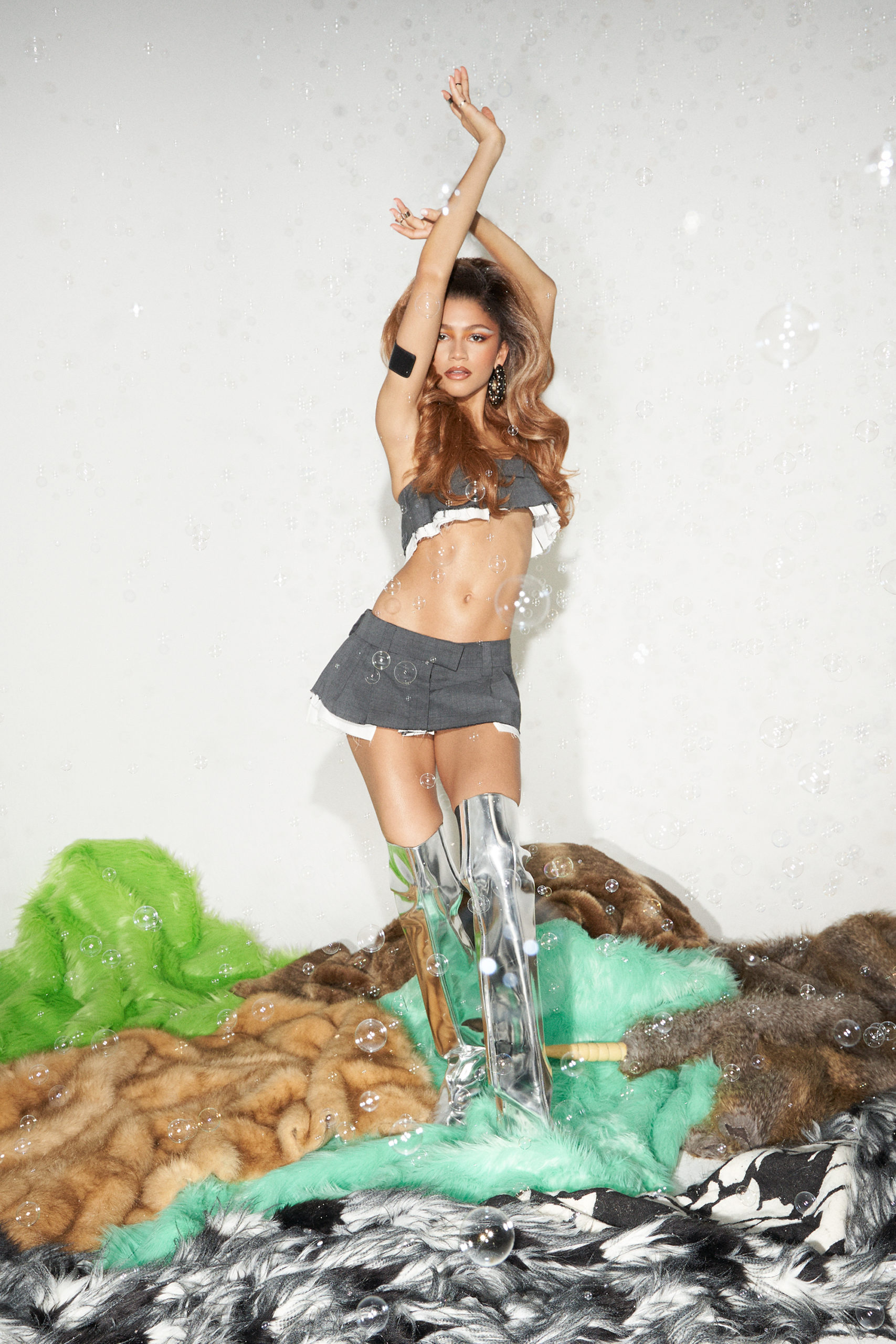
Top and Skirt by Miu Miu, Cuffs by Prada, Earrings by Alaïa, Rings by Burberry, Boots by Courrèges.
DOMINGO: I’m going to say something that’s probably going to embarrass you, but as I walked around that museum, I thought that there will be more people in there someday that have made an impact on history and culture and moved the needle on who we are. I thought, “Who else is going to be up on these walls?” And I thought about you, to be honest. I think you’re going to be on there. I hope that I will be on there as well.
ZENDAYA: Oh, absolutely. I’ll be underneath you in small print.
———
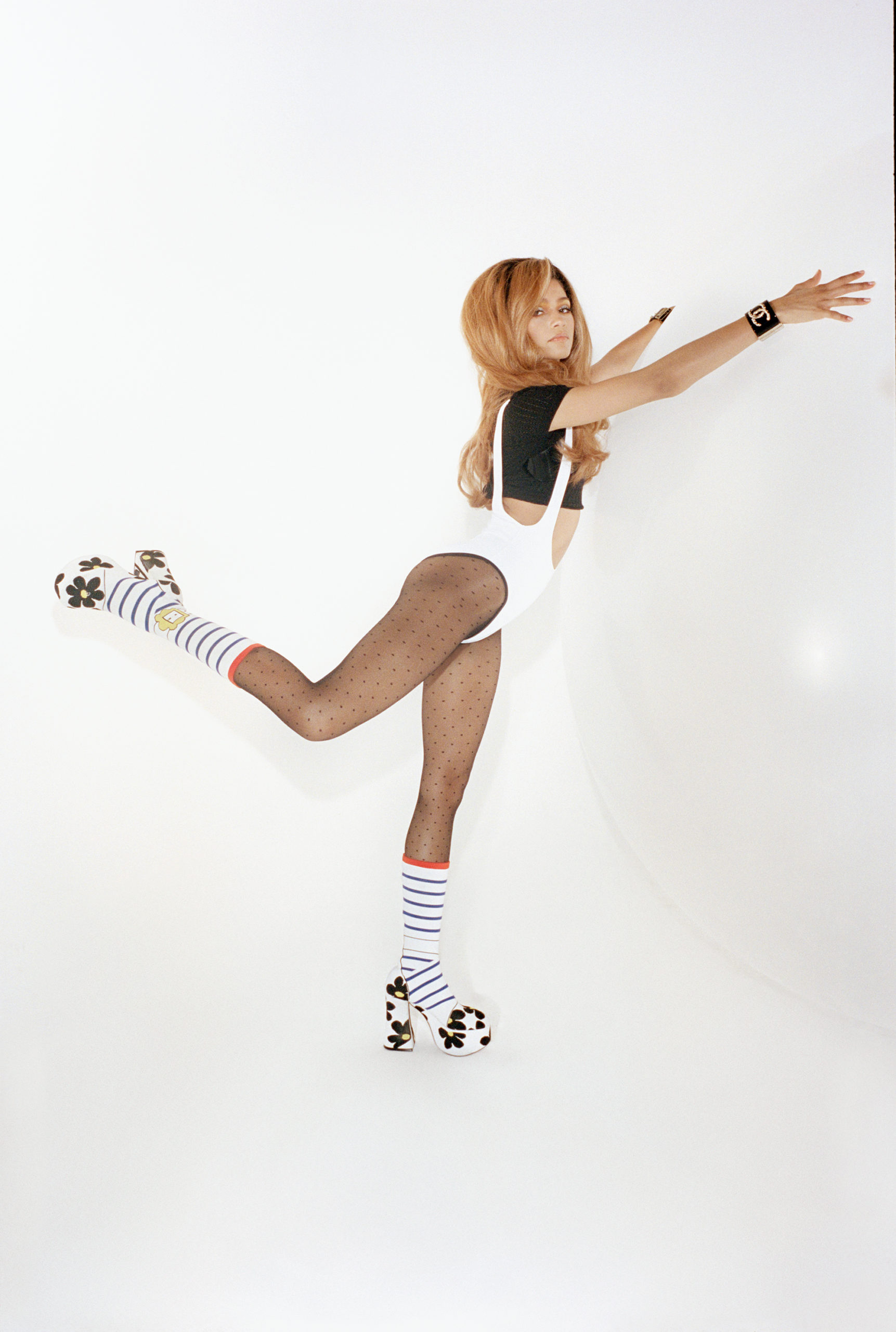
Top, Bathing Suit, and Cuffs by Chanel, Vintage Harness Stylist’s Own, Tights by Falke, Boots by Marni.
———
Hair: Antoinette Hill at Mastermind Management Group.
Makeup: Raoul Alejandre at Opus Beauty.
Set Design: Nicholas Des Jardins at Streeters.
Production: Taylor Brown and Perris Cavalier at The Morrison Group.
Manicure: Miwa Kobayashi.
Photography Assistant: Sabrina Victoria.
Fashion Assistants: Hayley Kuniansky and Justin Ramirez.
Set Design Assistants: Joe Rubino and Gautam Sahi.
Lighting Assistant: Victor Grössling.
Makeup Assistant: Alisa Yasuda.
Tailor: Travis Thi.
Special Thanks: Freehand Hotel and Goya Studios.

